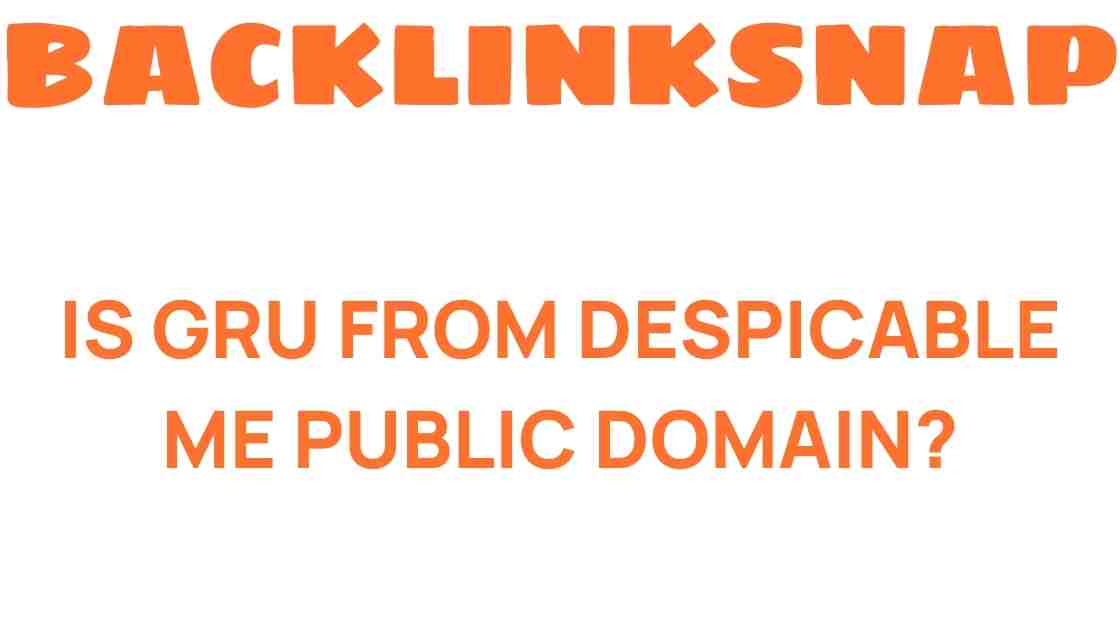Is Gru from Despicable Me Public Domain?
When we think of iconic animation characters, Gru from the beloved Despicable Me franchise undoubtedly comes to mind. Created by Universal Pictures and voiced by the talented Steve Carell, Gru has captured the hearts of audiences around the world with his humorous antics and heartfelt journey from villainy to fatherhood. But a question often arises among fans and creators alike: Is Gru from Despicable Me public domain? To address this inquiry, we must delve into the realms of copyright, character rights, and intellectual property.
The Nature of Copyright and Public Domain
Copyright is a form of legal protection granted to the creators of original works, including literary, dramatic, musical, and artistic endeavors. This means that characters like Gru are protected under copyright law. Public domain, on the other hand, refers to works that are no longer protected by copyright, allowing anyone to use, modify, and distribute them without permission. The length of copyright protection varies by jurisdiction, but typically lasts for the life of the author plus a number of years (usually 70 years in many countries).
Given that the Despicable Me franchise began in 2010, Gru is very much still under copyright protection. The character was created by the studio Illumination Entertainment, which is a subsidiary of Universal Pictures. Consequently, until the copyright expires, Gru cannot be freely used in other works without the permission of the copyright holders.
Character Rights and Intellectual Property
In addition to copyright, character rights play a significant role in determining the usage of characters like Gru. Characters can be trademarked, which provides an additional layer of protection. Trademarks help prevent unauthorized use of a character in a way that could confuse consumers or dilute the brand. Given Gru’s popularity and the extensive merchandise associated with the Despicable Me franchise, it’s highly likely that Universal Pictures has trademarked his likeness, name, and associated branding.
This means that even if a character were to enter the public domain, if it has been trademarked, the trademark could still prevent others from using the character in similar contexts that could lead to market confusion. Thus, even if the copyright for Gru were to expire in the distant future, trademark laws could still protect him from unauthorized use.
The Impact of Animation and Film on Character Longevity
Animation has a unique power to create lasting impressions on audiences, and characters like Gru exemplify this phenomenon. The Despicable Me films have not only been commercially successful but have also spawned sequels, spin-offs, and even a theme park attraction. This widespread recognition ensures that Gru remains a relevant character in popular culture.
One of the fascinating aspects of animated characters is their ability to evolve. While Gru started as a villain, his character development throughout the films showcases important themes of family, redemption, and love. This evolution contributes to the character’s lasting appeal and the ongoing interest in the Despicable Me franchise. As long as the character remains in the public eye, it is unlikely that he will enter the public domain anytime soon.
What Happens When Copyright Expires?
When copyright expires, the character can enter the public domain, allowing anyone to use it freely. However, this process can take decades. For characters created after 1978, copyright protection lasts for the life of the creator plus 70 years. In Gru’s case, since he was created in 2010, we are still many years away from any potential expiration of copyright, barring any changes in law.
How to Create Content Featuring Gru or Similar Characters
For aspiring creators or fans wanting to include Gru in their work, it’s important to understand how to navigate copyright and intellectual property laws. Here are some tips:
- Seek Permission: If you want to use Gru in your work, try contacting Universal Pictures or Illumination Entertainment for permission.
- Create Parody: In some jurisdictions, parody is protected under fair use, allowing for the use of copyrighted characters in a transformative way. Just be cautious—this is a legal gray area.
- Draw Inspiration: Instead of using Gru directly, consider creating a character inspired by him, ensuring it’s distinct enough to avoid copyright infringement.
- Understand Licensing: Some companies offer licensing agreements that allow creators to legally use popular characters in their projects.
Conclusion
In summary, Gru from Despicable Me is not public domain. He remains firmly under copyright protection, with character rights and trademark laws further safeguarding his likeness and associated properties. Understanding these aspects of intellectual property is crucial for anyone looking to create content involving such recognizable characters. As the franchise continues to thrive, Gru will likely remain a beloved figure in animation for years to come.
FAQs
1. Can I use Gru in my YouTube videos?
Using Gru without permission could infringe on copyright laws. It’s advisable to seek permission or use the character in a way that qualifies as fair use, such as parody.
2. When will Gru enter the public domain?
Gru is currently protected by copyright until at least 2080, given that he was created in 2010.
3. Are there other characters in the Despicable Me franchise also under copyright?
Yes, all characters from the Despicable Me franchise are protected by copyright, including the Minions and other supporting characters.
4. What happens if I create a parody of Gru?
If your parody is transformative and adds new meaning, it may fall under fair use, but this can vary based on jurisdiction.
5. Can I create merchandise featuring Gru?
Creating merchandise featuring Gru would require a licensing agreement with Universal Pictures or Illumination Entertainment to avoid potential legal issues.
6. Are there any resources for understanding copyright law better?
Yes, websites like the Cornell Law School provide valuable information on copyright and intellectual property law.
This article is in the category Digital Marketing and created by BacklinkSnap Team




